



![]()
" Think About it..."
mailed to your home for only $12. S&H included
True Police Stories
"Courage is the ability to move;
when all around you are frozen in fear
and no one would blame you if you did nothing at all."
Capt. Click. Phx. PD
My Name is Chief Keith Shumway
In 1983, after twenty years of service, I retired as Chief of Police from the University of Nevada, Reno, with a degree in Criminal Justice. Blanding, Utah is my hometown. My wife, Corinne, and I are the parents of 6 children and 18 grandchildren. Prior to marriage I served for four years in the United States Navy in the 7th fleet during the Korean conflict. There, I was a Quarter Master Navigator in Commander Squadron 3.
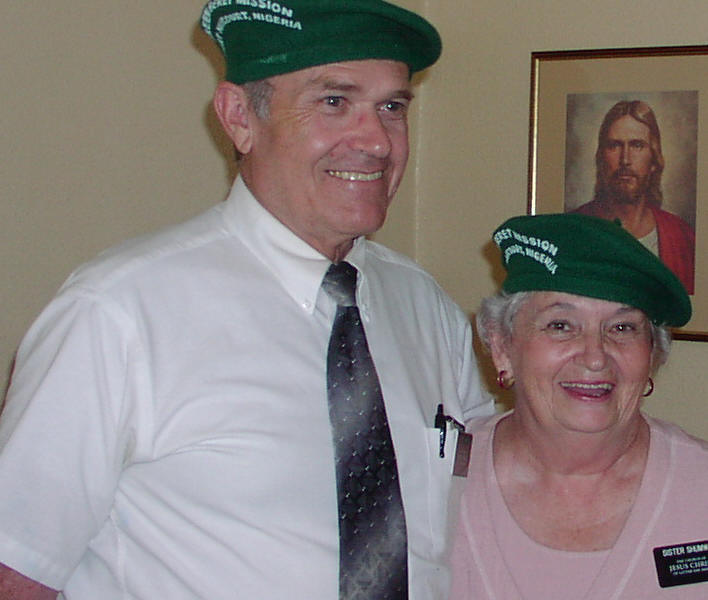
Port Harcourt Green Beret Mission
As most police officers and former soldiers, I've had a verity of experiences but the story I'd like to share with you is the most surprising and unusual thing that ever happened to Corrine and I. In all probability, it could be the most unusual thing that ever does happen to us. However, it is something that in the end, left us with treasured memories we will never forget.
While Corrine and I were nearing the end of our mission at the Arizona at the Mesa Family History Center, we put in our papers for another mission. We were hoping for and expecting a nice easy mission with beautiful surroundings, hopefully someplace in England. What we got was quite a surprise. Shock is probably a more accurate description of our feelings when we received the mission call letter from President Gordon B. Hinkley, President of the Church of Jesus Christ of Latter-day Saints.
The letter said we were asked to go to the Nigeria Port Harcourt Mission!
It talked about the great need for family history work there and that we being asked to serve in that field. It took about a week to mentally accept that we were actually going to be serving a family history mission in Africa. After the shock began to ware off, we began to possibilitize about it and began to say to each other, "We could do it! We could go and work in a family history center just like we had done in Mesa, Arizona. The setting would just be different!"
"Yes, we could do it!"
But when Bishop Frehner came to our home to visit with us and we speculated on what our role might be. With great perception, he told us he thought that we would probably be in charge of the family history program for that particular mission and that there were probably not family history centers, as we knew them here. After that bit of news, we were slightly hysterical for several days the unknown has a tendency to do that!
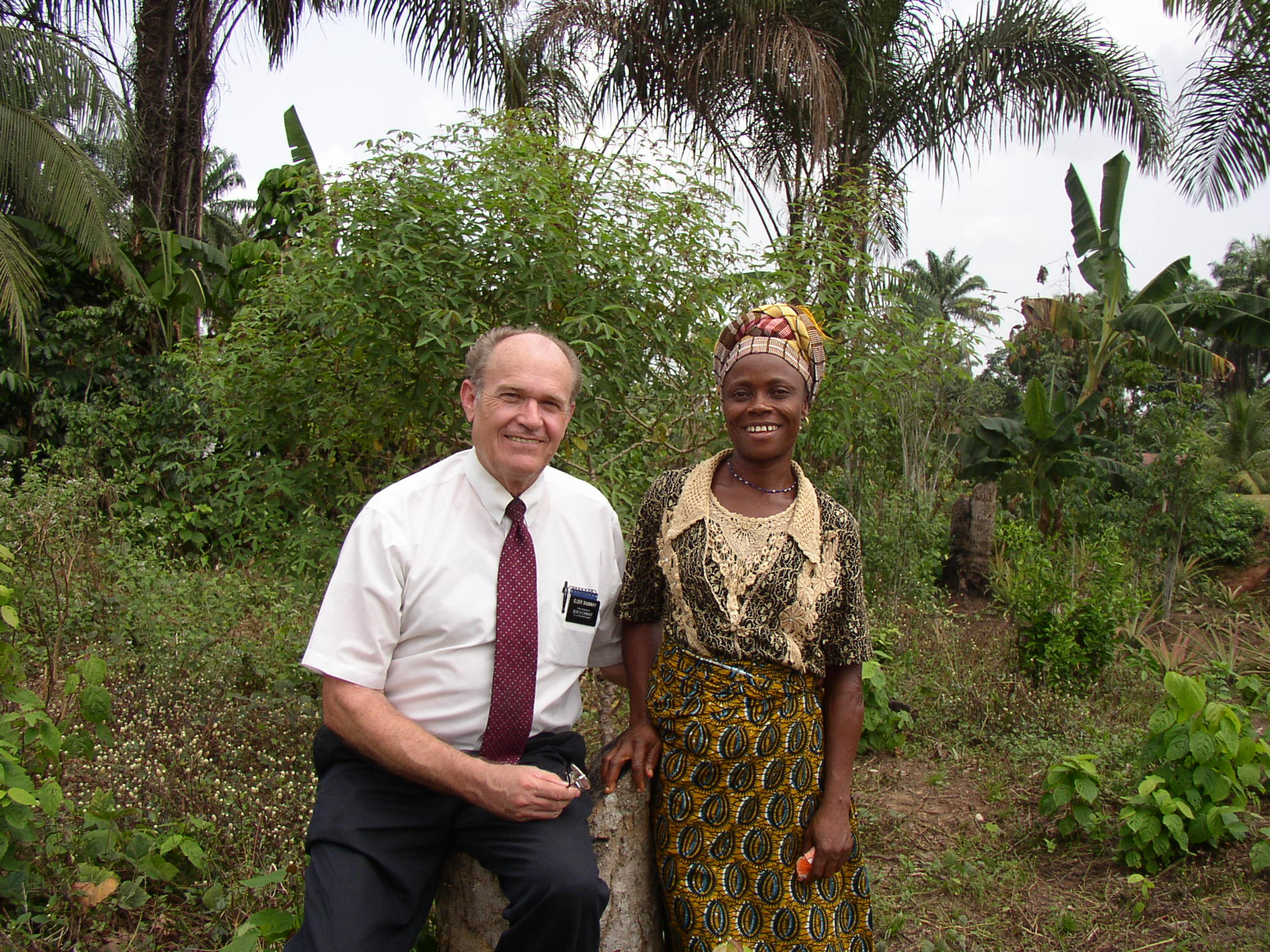
Elder Shumway and a Nigerian Sister at the Village of Ono
Later on, the phone call came from Salt Lake City indeed, we would be over family history for the Nigeria Port Harcourt Mission. It consisted of nine stakes, two districts and six mission branches. We would live in the city of Uyo, Akwa Ibom State, Nigeria. Our role would be diverse travel to the various stakes to train stake and ward leaders, set up computer systems, teach people to use the computers, teach PAF (Personal Ancestral File), teach people how to complete the forms accurately, maintain a computerized record of all the family history records of the mission, audit and compile the records then submit them to the West Africa databank in Ghana. We would spend the first week of our mission at the MTC in Provo then fly to Ghana to receive specific training for a week prior to going on to Nigeria.
Upon our arrival in Nigeria,
I can honestly say that in my life
I have never felt so inadequate!
There we met Elder and Sister Bevan who were great trainers. In addition to introducing us to life in West Africa, they took us into their home and nurtured us. Cultural shock set in and the sense of inadequacy increased.
What in the world were we doing here?
The Bevans knew we were over-whelmed and probably wondered why in the world the Lord selected us to come to West Africa! The four of us went down to the West Africa Area offices for their staff meeting. While we were there, we had one of the greatest privileges of our lives! We went in to visit with Elder Ross Workman of the Seventy. At that time, he was a counselor to President Bruce Stucki of the West Africa Area.
At the end of our visit with Elder Workman, he asked if we would kneel around the occasional table and allow him to bless us. In our lives we never dreamed of the great bequest that it is to be blessed by a general authority of the church. This wonderful spiritual giant called down a blessing on us from Heavenly Father. He told us that the Lord was pleased with us for accepting this calling and he emphasized that the Lord qualifies those whom he calls - we would be able to accomplish the work that we were assigned to do.
A major concern for us in accepting this mission call was for our family we were told that our families would be blessed because we were willing to serve in this third world country. He pronounced many blessings that would be ours if we were faithful we received in abundance all of these blessings and many more.
In adjusting to our lives and duties,
it was cultural shock indeed!
After being ripped off for $100 American dollars in Ghana, (a story in itself) we thought we were prepared for anything. We arrived in Lagos, Nigeria a frightening city. We flew into the International Airport and staff from the LDS offices met us and took us to the city airport. Fortunately, we had joined our mission president and wife, Jimmie and Sue Sanders, in Accra, Ghana for the journey to Port Harcourt, Nigeria. We loved them instantly!
The traffic was an unbelievable experience. Bumper to bumper dilapidated cars, horns honking, people turning around and coming back the opposite direction of traffic in the same lane, everyone trying to get in front of the car in front of them.
We soon learned that this is just a regular day in Nigeria!
Lagos Airport was a shocking experience. On the main floor there was one chair it belonged to the security guard. She was generous and allowed Sister Sanders and my wife to take turns sitting on it. We were in line forever had we not been so tired it would have been comical! Men, filled with self-importance and wearing chief regalia, crowded in or had someone crowd in the lines. People were ducking under ropes, climbing over luggage and pushing to be first at anything and everything. Waiting your turn isnt part of the culture!
Finally, we arrived in Port Harcourt. Someone from the mission came to pick us up. Thank goodness for the Sanders, they had been through the airport routine several times and knew what to do and who to please! We stayed in Port Harcourt at the mission home for two days. Sister Sanders was so gracious! We celebrated Thanksgiving and met the other ten couples that were assigned to the mission. They came from Aba, Owerri, Ikot Ekpene, Umuahia, Calabar, Uyo and Port Harcourt. Their assignments varied: Building of Temple, Proselyting, Church Education, Humanitarian, Office, and the Mission President.
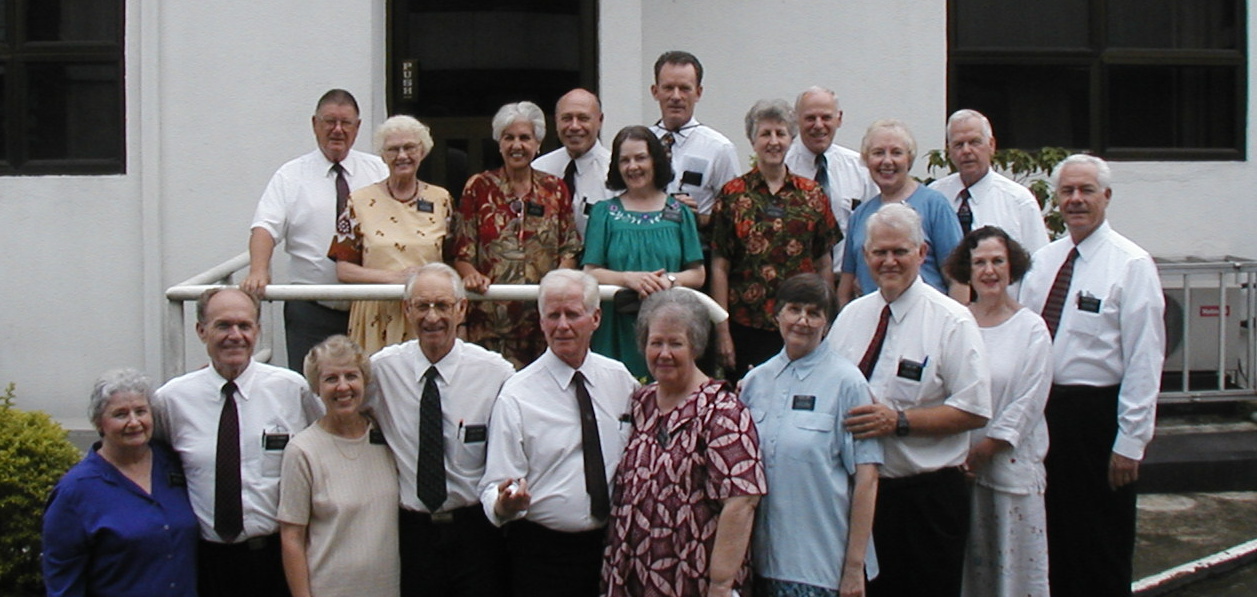
We wrote a check for $1,250 to the church. They deducted our rent for the house and car and gave us the balance in Naira a sack full! We had already been warned not to bring our credit cards and that we would write one check to the church once a month they would make certain that our checking account number was never revealed. Nigeria is a cash society! There is a scam per second!
Friday morning, the first thing that I did was to go over to the drivers license office. No driving test just showed them my Nevada drivers license, paid my fee and bribed the man in charge with an extra $20.00. I was told that I could come back and get it in a month. There, everyone expects "a dash" (a bribe).
The Lindseys took us to the grocery store where the couples shop. Park and Shop! What an experience. We got on the expressway, which is four-lane traffic on both sides; however the cars were a minimum of six abreast on both sides of the expressway. Four lanes, but six abreast and it was bumper to bumper. Dilapidated vans with no less than 20 people smashed together inside no air conditioning crowding in front of the car in the next lane by simply moving over and putting the front of your vehicle in front of the fender of the other car and daring to be hit. Beggars and salespeople run along side of the cars how they dont get run over is a miracle! Two men on a motorbike, with a pig strapped on behind, passed us and I saw my first pig heading for the butcher shop!
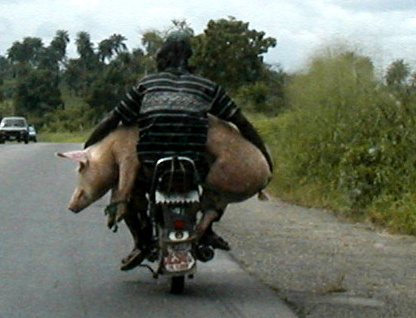
So many vehicles and no enforcement of laws made the situation beyond belief!
We arrived at the grocery. The products were strange! Sister Lindsey helped my wife select enough groceries to last us a couple of weeks. When I paid for our purchases the cost was staggering and I had to count out the money the clerk finally counted my money for me or we would still be there! The denomination of the bills was small! We learned to count out the money beforehand and rubber band it in stacks then when we handed over the money for them to count, we had already counted it once. I carried my money around in a plastic zip lock bag until I found a cosmetic bag that would fit in my pocket! We hid our money in strange locations around the house and carried only what we thought we would need each day!
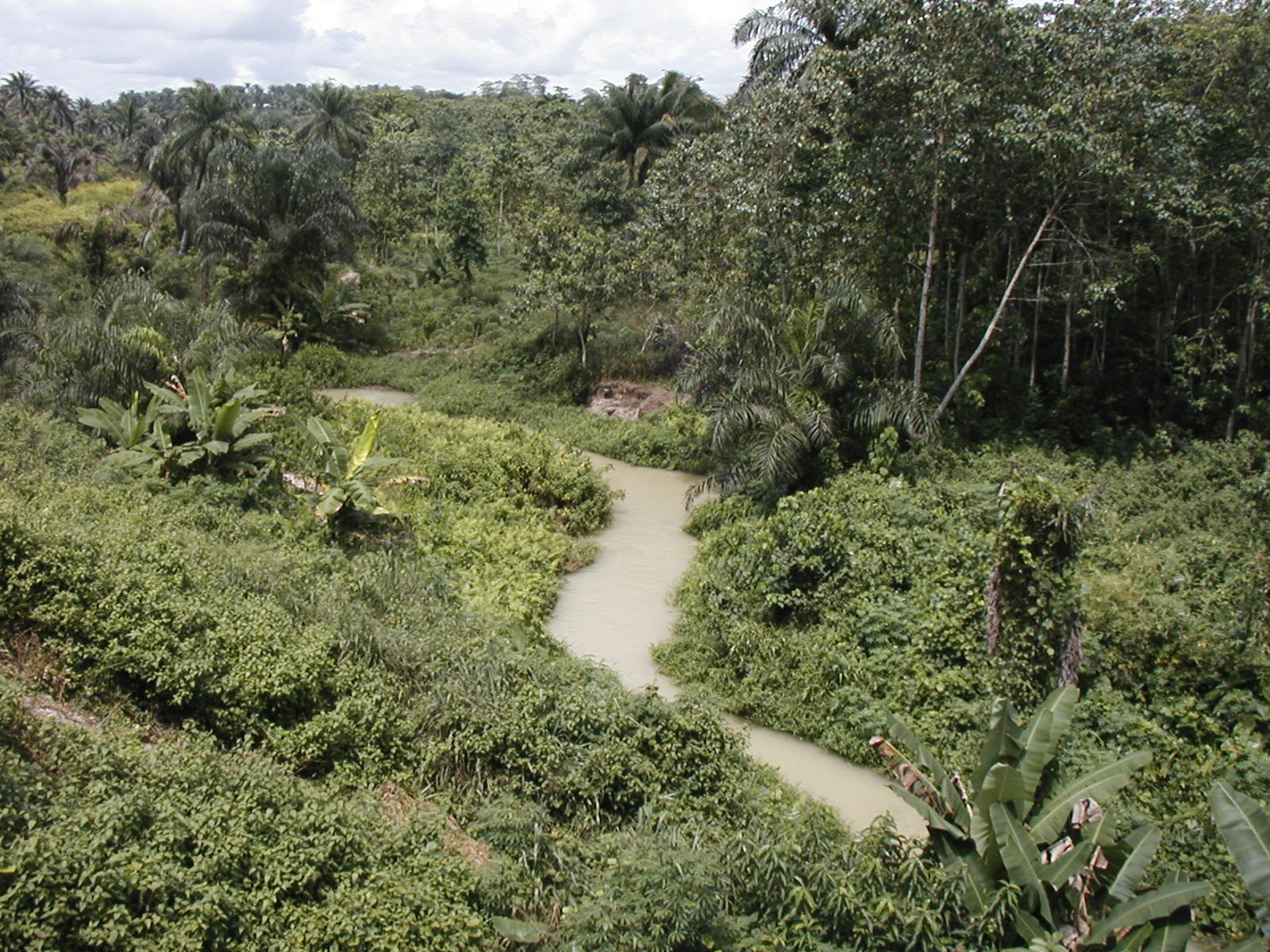
We returned to the mission office and picked up our gray Toyota. Off we went following the Lindseys to Uyo. It is simply impossible to describe the traffic and the condition of the roads. Bizarre is the only word I can think of at the moment. About every 30 miles we would come to a police barricade with about four officers with sub-machine guns. Because our cars had the word, "MISSIONARY" written on them, they waved us through. However, all other vehicles were stopped and the drivers gave the police "a dash" so they could go through without being arrested for a real or trumped up charge! This became an everyday occurrence for 18 months.
We never got used to the corruptness or the guns!
The jungle was beautiful! There are palm trees of many varieties. We passed an area where an oil refinery is located the fuel trucks were parked on the freeway for miles. They may be parked there for days waiting their turn to fill their truck. Petrol availability and the price of it keep the general population oppressed.
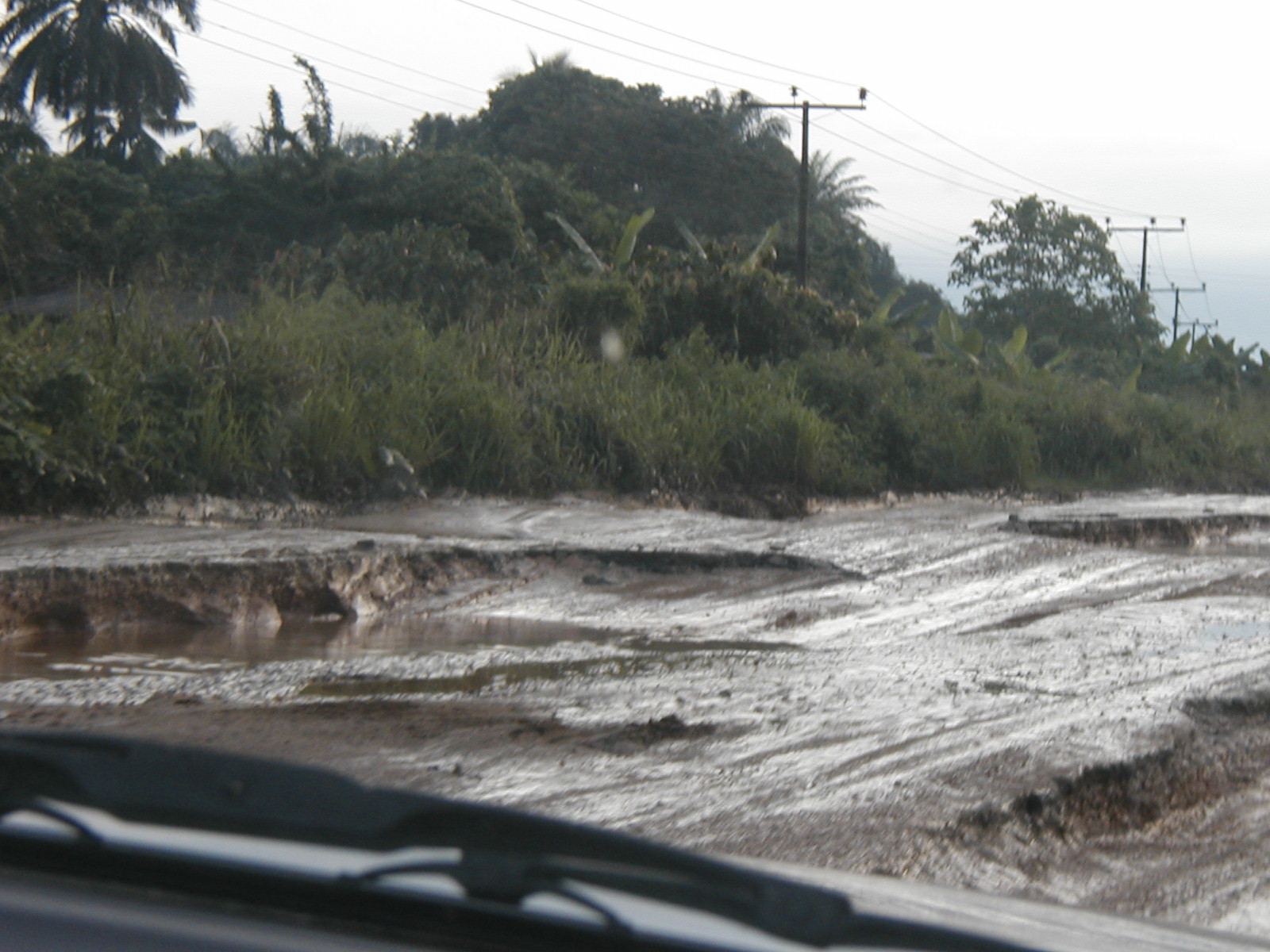
We learned that it is not unusual for drivers to drive on either side of the freeway both directions. Talk about heart stoppers! The potholes were large and many; so people drive on either side of the road to avoid them. During the rainy season the roads are destroyed and the federal and state governments argue about who should pay to repair them so no one does. It is not unusual to see one or two men or boys filling in the holes with sand hoping that someone will dash them for their effort.
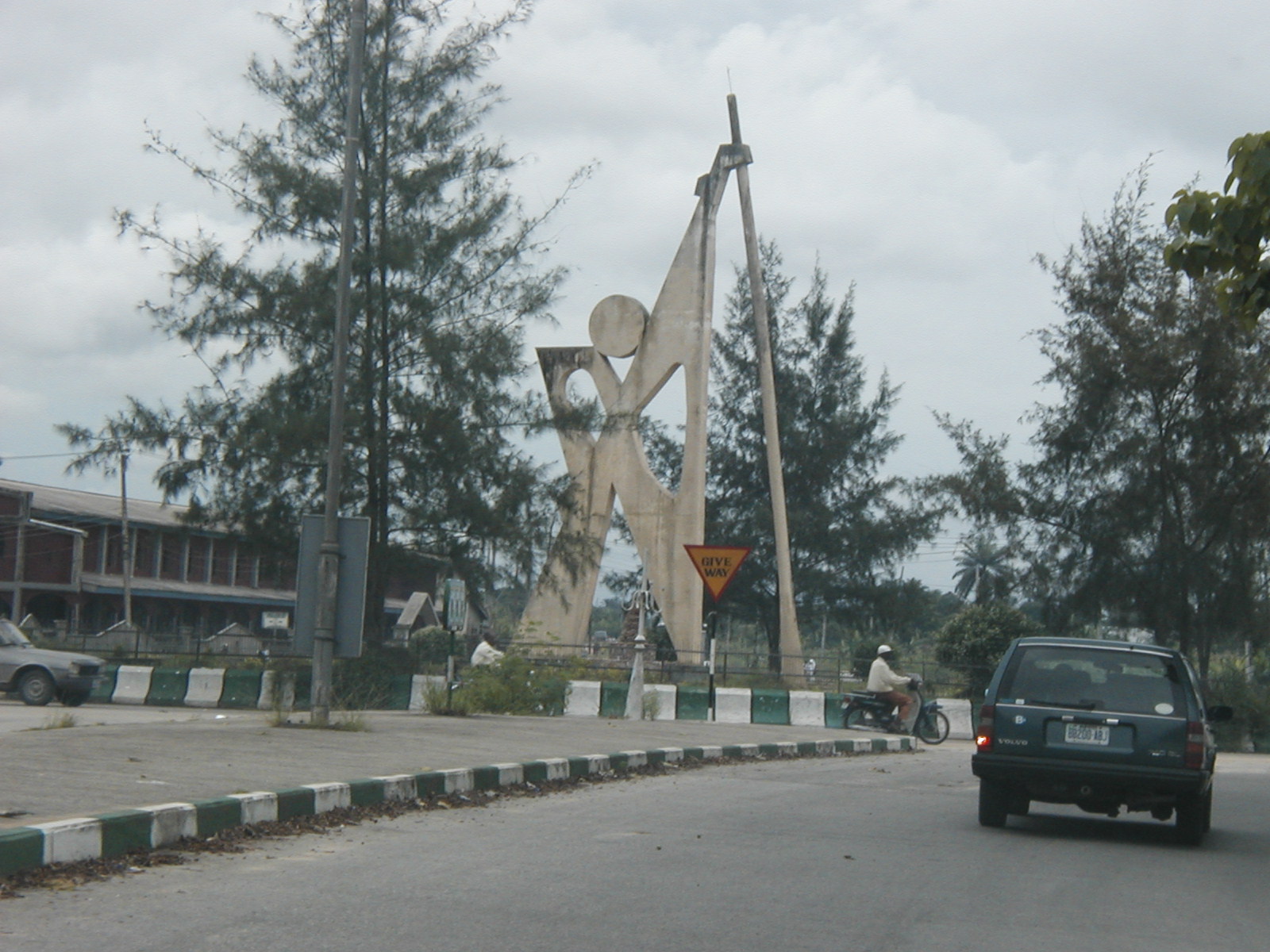
We arrived in Uyo our home for the next 18 months. No traffic lights but five wonderful roundabouts. Each had a statue in the center and we used them as landmarks to find our way through this city of over a million people. Uyo is known as the motorbike (Okada) capital of the world!
Five or more people riding on a motorbike is not unusual
and there are many accidents and deaths everyday life in Nigeria!
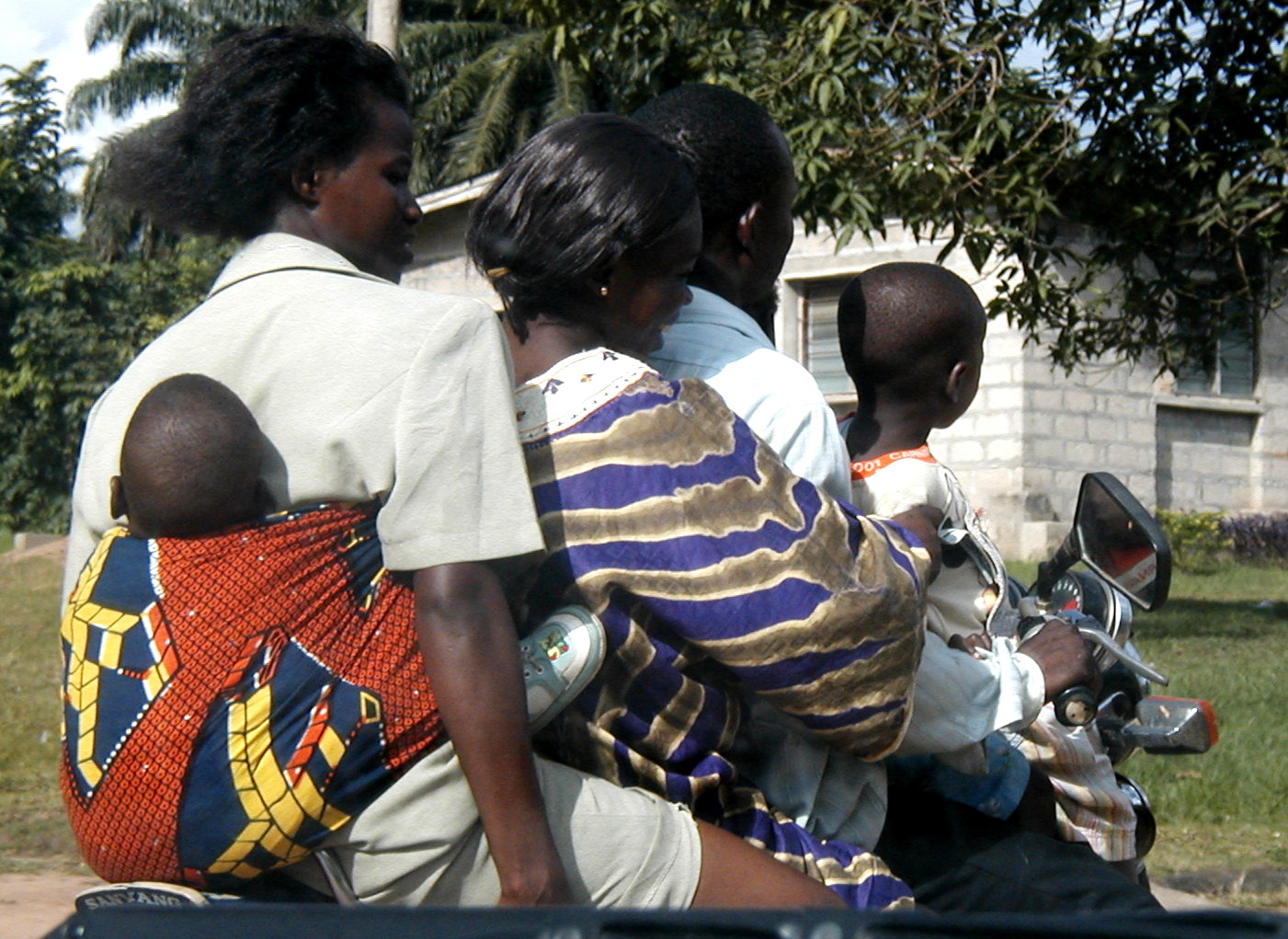
Driving down the street with motorbikes dashing in and out was like being in a swarm of mosquitoes. Because the majority of the people are poor they walk or pay to ride on the back of a motorbike. The roads were in a state of disrepair, vehicles on the road were in a state of disrepair with tires that were bald, the roads were narrow and full of potholes, cars drove in the lane with the fewest potholes and large trucks drove in the middle and they did not move over. If the road was oiled there was always a ledge with no shoulder. The van transport vehicles were the most dangerous the vehicles were old and not maintained. The drivers were wild and the passengers were jammed in. The police stopped the vehicles about every 30 miles. The government might be as much as six months behind in paying them so they survived on dashes from the people.
People walked along the narrow roads. The jungles grew up to the oiled shoulders in many places. In addition to the traffic and the people, there were bicycles, motorbikes and in the cities, salespeople and beggars. All this, along with the terrible roads was terrifying! It took all of my concentration to drive the vehicle safely. My wife memorized the directions to all of the cities and villages and told me where to go.
The Lindseys took us to our house the Nauvoo House, so named because it had the only extra bedroom. We hosted the other missionaries when they worked in the Uyo area. We were introduced to our two guards Edim and Harrison. They greeted us with a big, "YOU ARE WELCOME!" They worked 12 hours a day each, seven days a week for $2.40 per day. Each had large families that we came to love dearly. In meeting them, things began to change. They guarded our house and yard it was surrounded with a cement block fence with shards of glass and sharp metal objects on the top. They cleaned the yard and tended the beautiful flowers. The yard had banana, avocado, mango, papaya, and native vegetables that they grew to take home to their families.
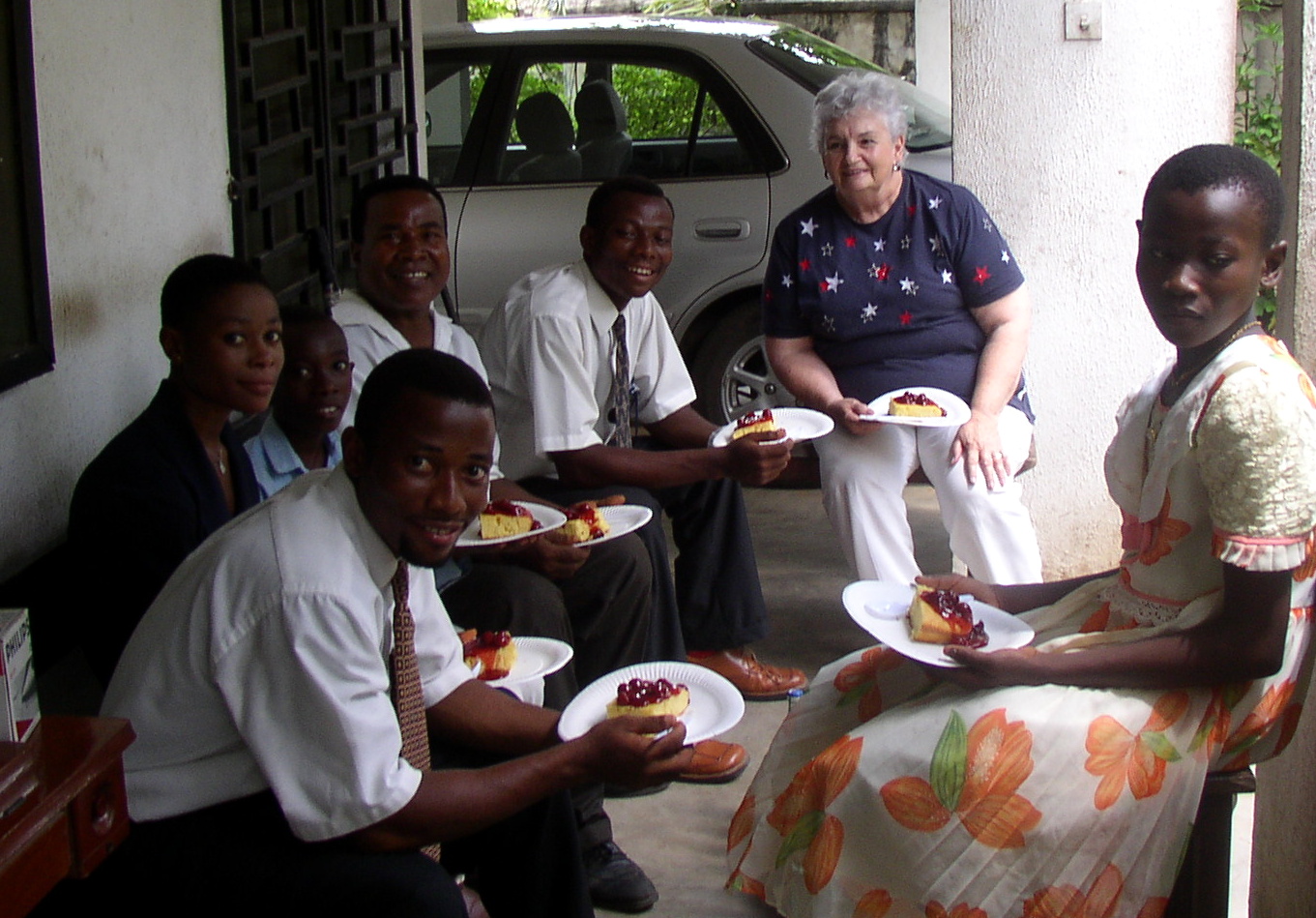
It took us quite awhile to get used to our house. We were comfortable with our gray cement floors. The electricity drove us a little crazy it was off more than it was on. So we were given a generator but it broke down regularly. Water came about every two weeks to fill our plastic water tanks so we rationed. Our shower was strange but it served the purpose! We sanitized everything every surface, all food, cans etc. Our greatest treasures were the plastic bags that we brought with us. We washed them and hung them out to dry to be reused. Without them life would have been very difficult!
Our household duties were fairly time consuming since things were fairly primitive! We had to sanitize everything. We just had cold water to the kitchen sink. We filtered all of the water that we used for drinking and cooking. Our fridge was small but we were able to locate three ice trays my job was to keep us in ice. Since it was so hot we used a lot of ice. We kept it in a plastic bag and tried to keep ahead of the game. Between the generator and NEPA we were able to keep the fridge cold. Our washing machine took about 8 hours to do a load if we left it up to its own devices. We tried to do laundry when we were working at the house that way we could carry buckets of water and pour it into the washer rather than allow it to fill from the water system. We hung our laundry in the spare room.
Nigeria is an English speaking country. Most people are bilingual! However, we could not understand them nor could they understand us. Sister Lindsey spoke a word at a time and we practiced her good example. Elder Lindsey counseled us that the names of the cities and the names of the people are pronounced using the soft vowel sound as in Spanish. This was a major help! We felt so helpless! There were few street signs and we continually got lost. We followed written directions everywhere we went they were confusing since they went from landmark to landmark. If the Mobil station in Uyo had moved we would have been forever lost. It was our pivot point!
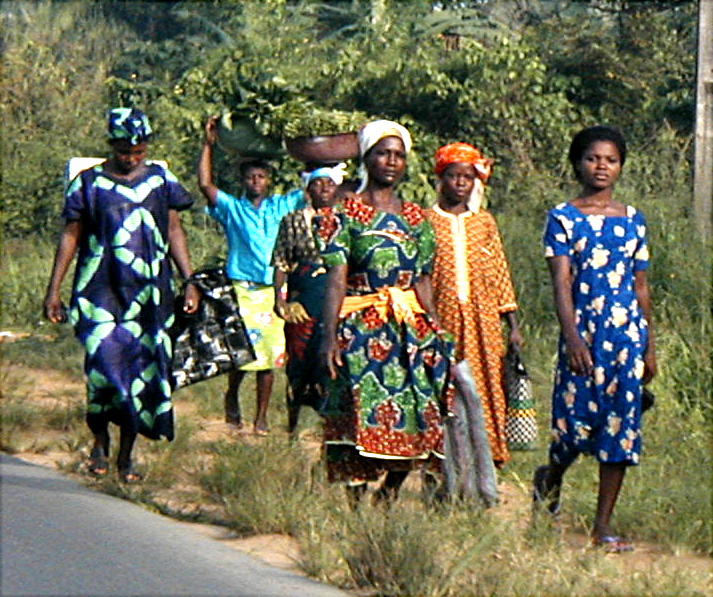
But the Lord always watched over us! In addition to assigning a guardian angel to ride shotgun for us, he watched out for us every minute of our 18 months. One day we drove to Calabar to pay two years rent for our house. The landlord had given us instructions to get to his office we managed to get very lost! We pulled over and tried to question a man on the street! It was hopeless!
But out of nowhere came a man, waving his recommend.
"Elder, I am a member, can I help!"
He drove his car in head of us! He took us to the address that we had only to find that the man we sought had gone to a wedding reception. He took us there! We are talking about two hours out of his workday. He refused to take payment but finally agreed to take money for petrol!
On another occasion, the Lord rescued me from a potential disaster! We had our office down at the Uyo Stake Center. In order for us to use the computer, the generator had to be started since NEPA (electricity) was undependable. The Stake President was in Ghana for the week, therefore, we had the only key to the generator. My wife went to the office to get the doors unlocked and the office opened. I walked to the generator building and got the generator going and then walked back to the building through deep grass. Suddenly someone spoke to me,
"You dropped your key!"
I looked around but saw no one! I looked at my key ring the clip had come open and the generator key was missing! I looked down at my feet in the thick grass and there was the key to the generator!
I testify to you that the Lord was watching over me!
To lose that key would have caused many problems. It would have slowed down the Lords work! I was overwhelmed for most of the day by what had happened! It was so wonderful to know that He was watching over me almost as though I was a child and He had me by the hand! I knew that if He was watching over the small things then surely He was taking care of the larger problems.
We divided up our work based on our individual talents. My wife conducted trainings on typing, computers, PAF and how to complete the genealogy forms. In addition she did all of our computer input. I took care of six young West African missionaries they had more needs than anyone could imagine. They were constantly without something electricity, water or butane. Their bicycles and beds broke down regularly. We loved those guys typical 19-year-olds. We had some great experiences together with them.
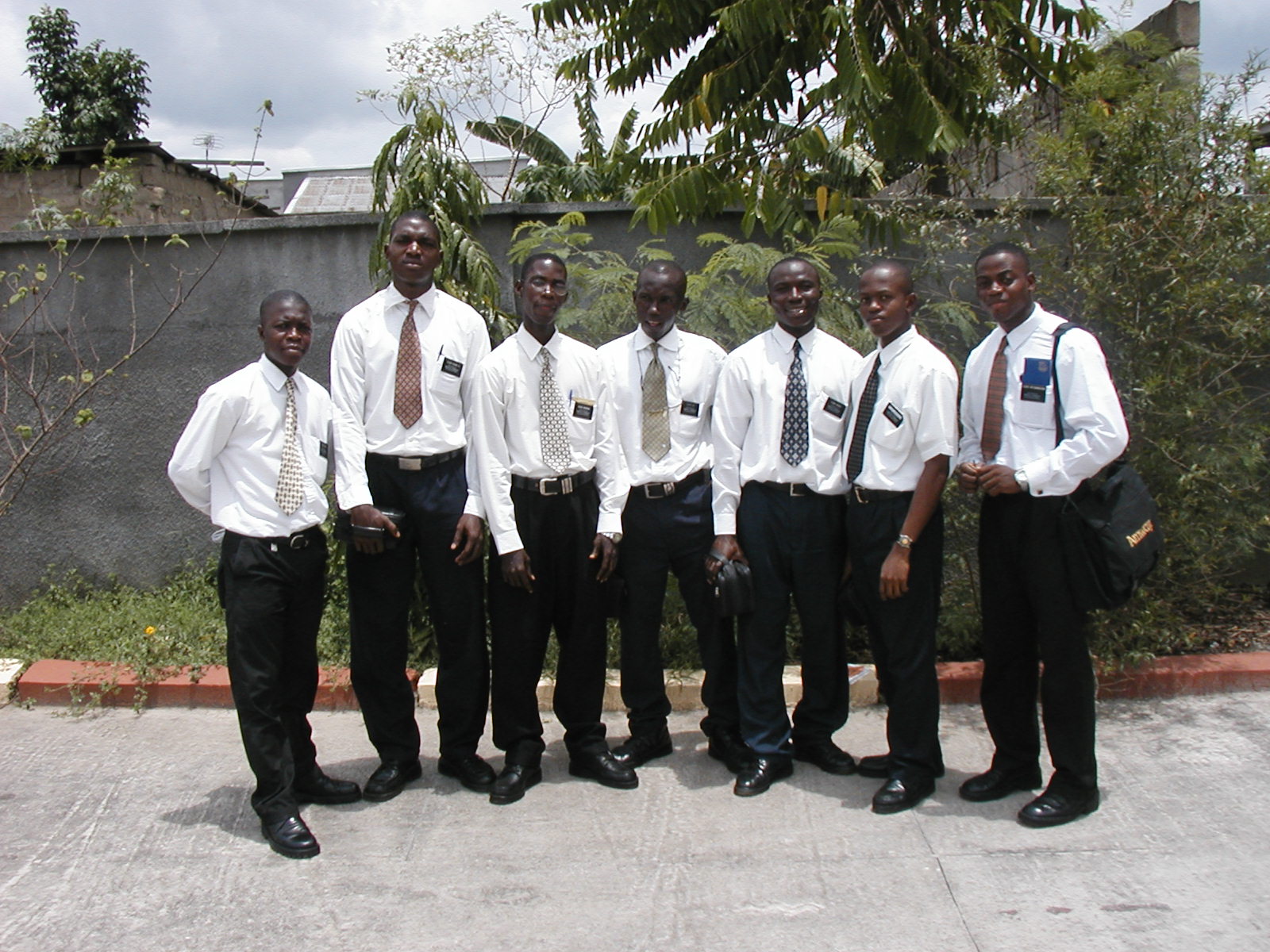
Nigeria, 3 times the size of Great Britain, is comprised of 37 states. We covered five of these states in our work. Driving on the roads was the most difficult part of our mission. We spent a good share of our mission in our little gray Toyota. There is no way to describe the degree of dangerous conditions that we faced each day. But the country itself beautiful and so are the people. There are many social needs that are unmet in Nigeria. Healthcare, eye care, mental healthcare, mosquito problems, disease, river pollution, deforestation, infrastructure electricity, telephone, roads are a few. The list goes on and on! But the people in general are wonderful people.
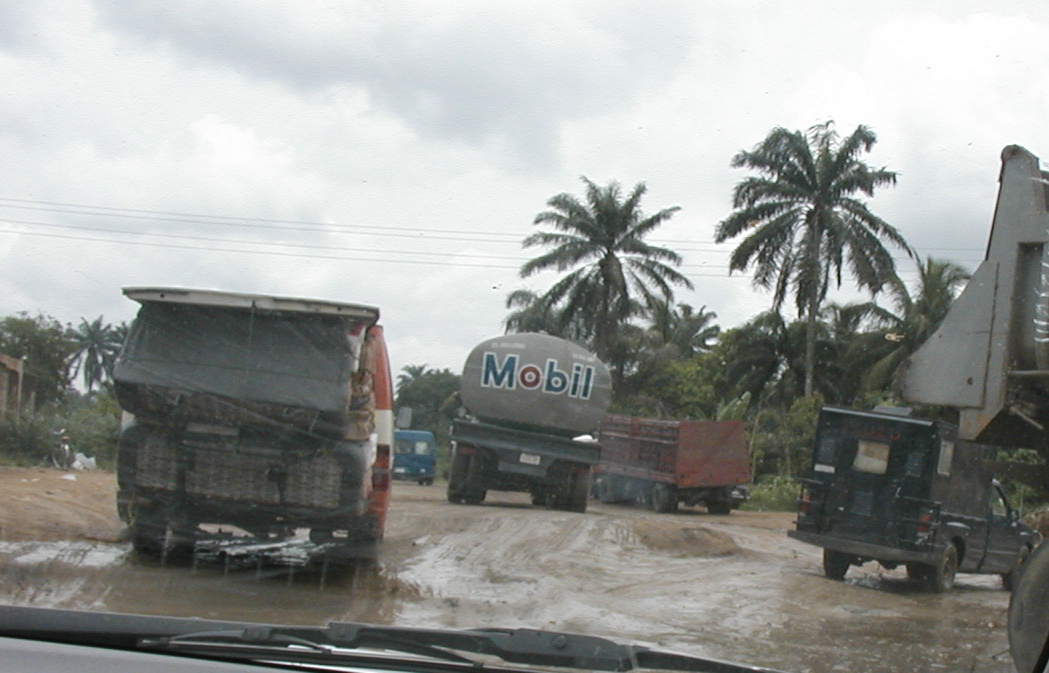
Most southern Nigerians are oppressed and have great difficulty in obtaining the necessities to sustain life. On a visit to Nsit Ubium, Nigeria, we had the opportunity to visit the Ikot Eyo government school. The headmaster was most gracious and took us and two local bishops on a tour of the facility. There were 975 students attending this facility. There were three sessions of 325 students each. There were twenty teachers and they taught all three sessions. The school had just ten tables and chairs and there were no restroom facilities.
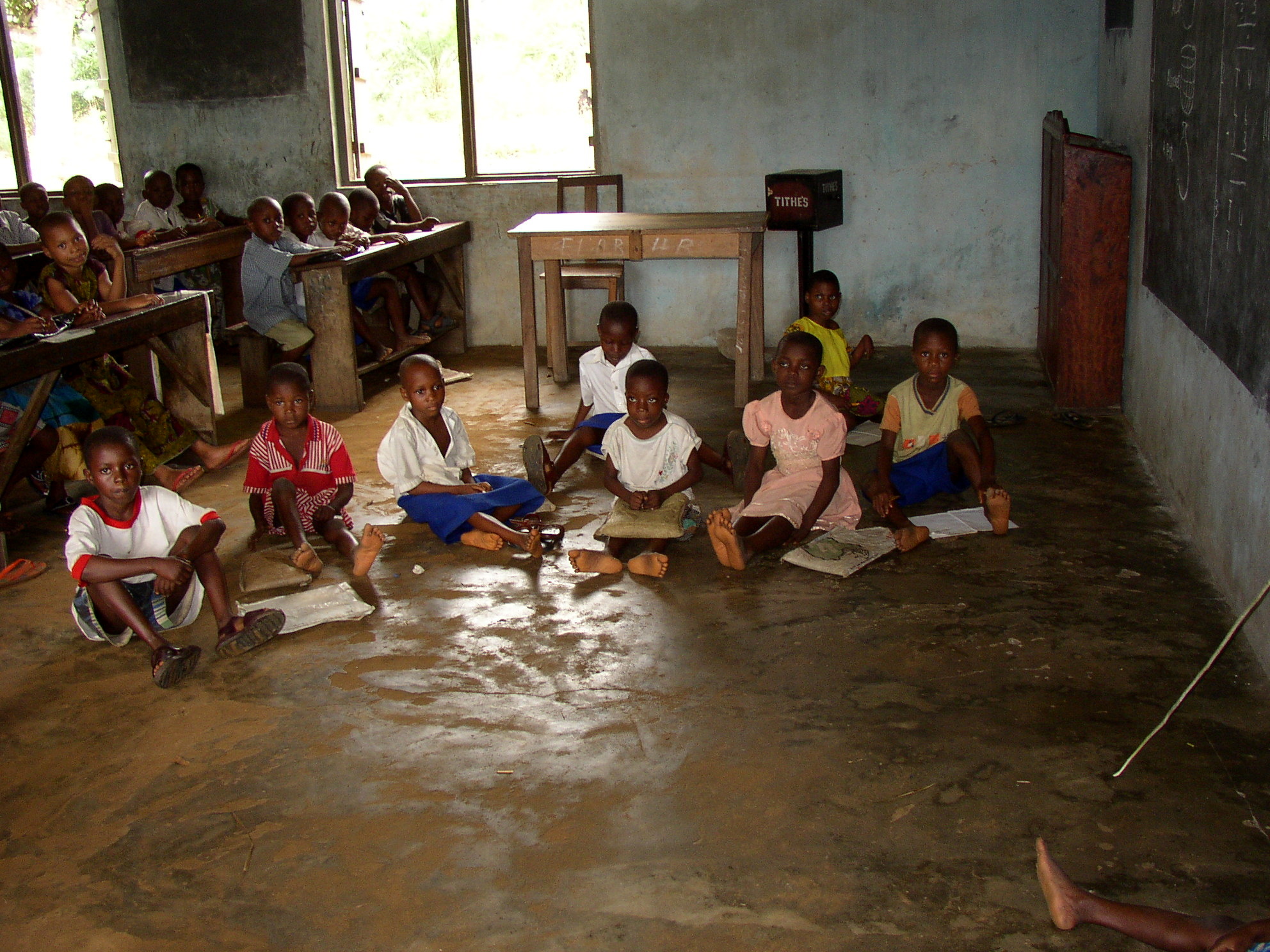
The students were beautiful with soft brown eyes and radiant white smiles. Books are limited, therefore most of the learning is done by the rote method (memorization). The school has no electricity, no windows just open spaces, and gray cement floors.
When we left the school, we could not get the school out of their minds. We wrote to our family and friends and told them about the school and how we wished that they could find a way to obtain desks for the students and tables and chairs for the teachers. The goodness of our friends stateside was amazing! Before long, donations were pouring in to our daughter, Kellee, who was managing our business. Soon there were sufficient funds to build desks for fifty students in addition to tables and chairs for the teachers.
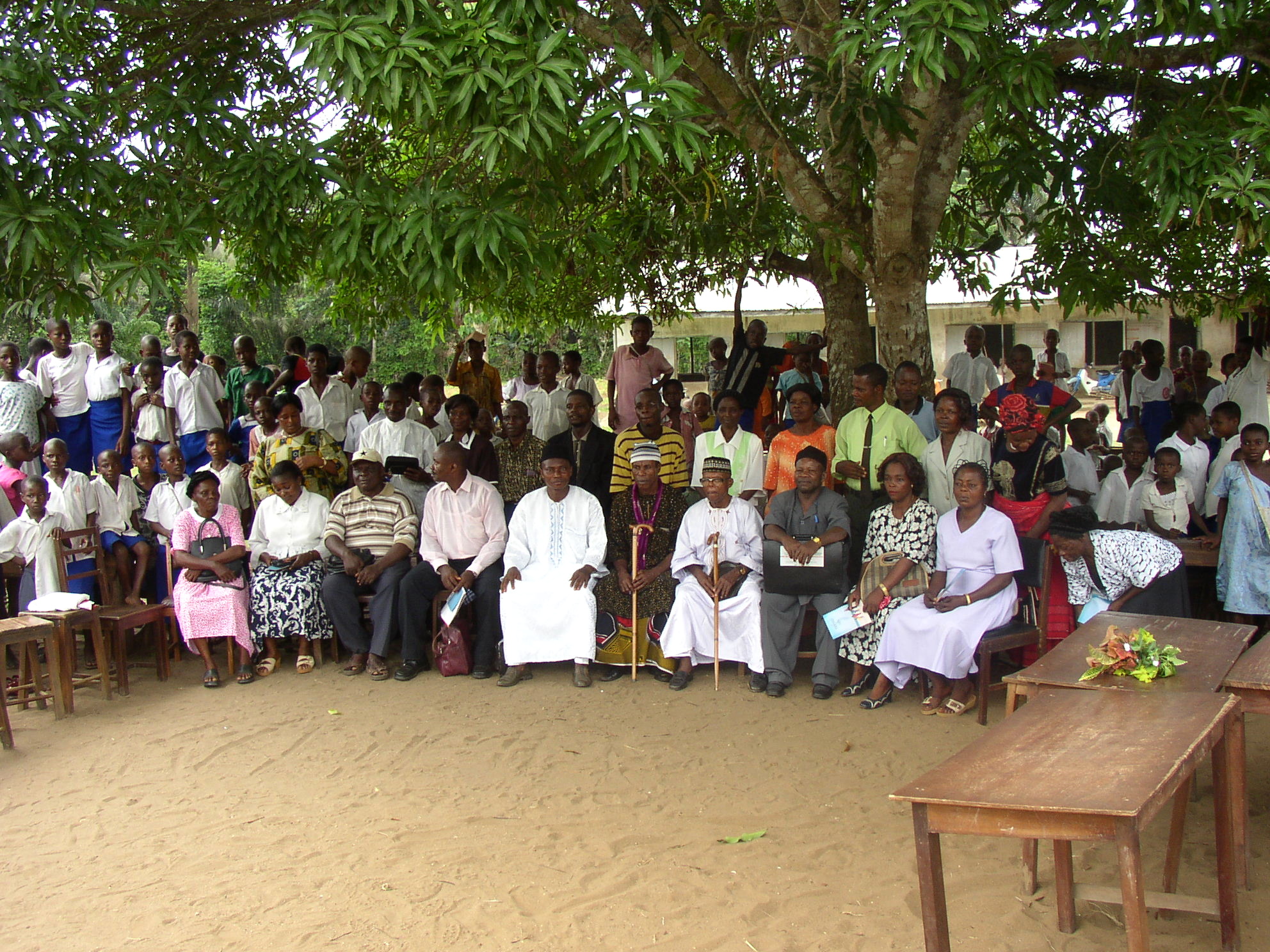
Isaac, a wonderful friend of ours in Nigeria, purchased quality wood, located a carpenter to build the desks, tables and chairs. He rented a truck and delivered the finished furniture to the school. In America this would be a simple task. In Nigeria, to accomplish all of this is a major undertaking. This wonderful resourceful young man did a wonderful job and the carpenter did an excellent job in constructing this furniture.
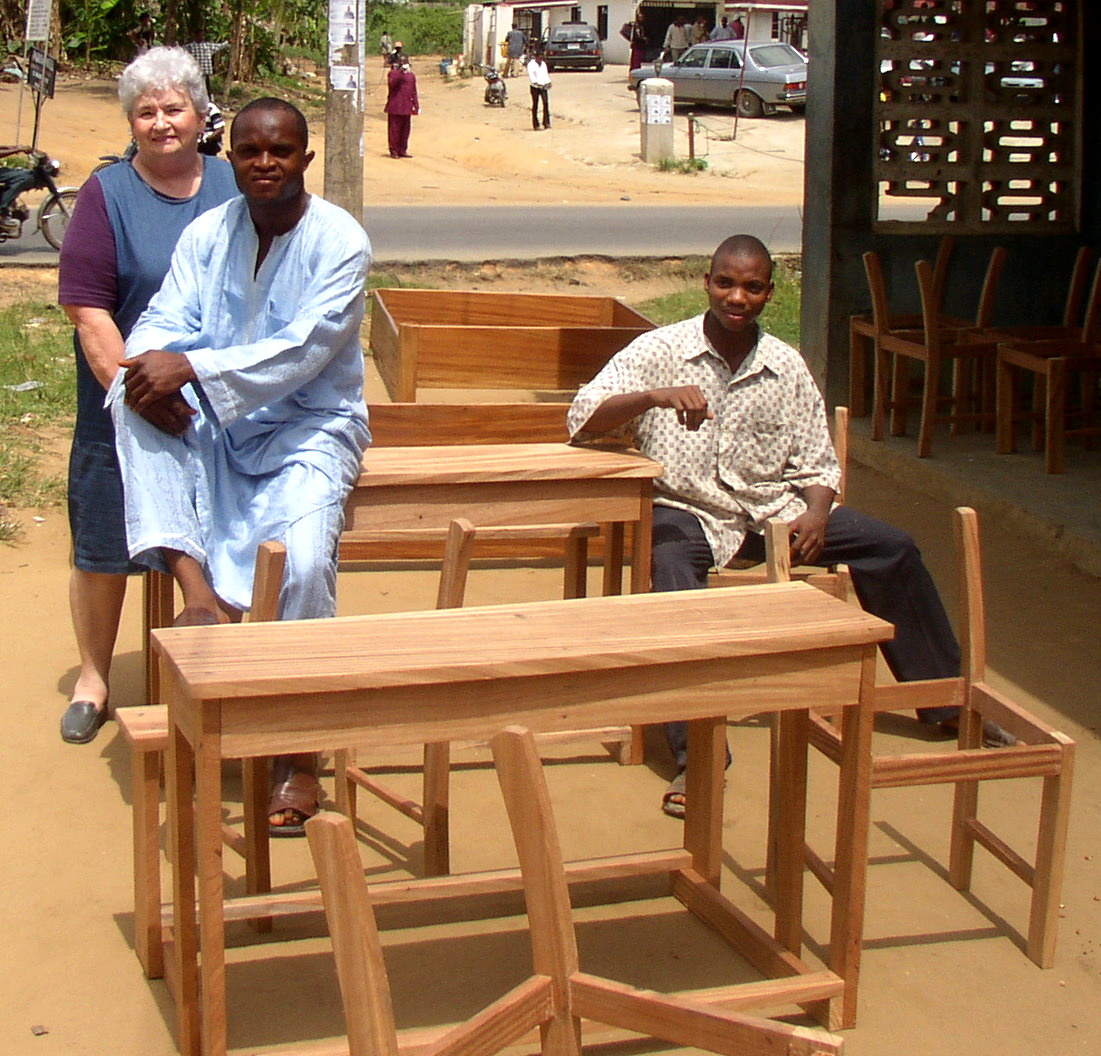
When the tables and chairs were done, we stopped in at the school and arranged to deliver the furniture to the school on a specific day. The headmaster was delighted beyond belief. On that day, he and the teachers had a surprise for us - they were building a restroom facility for the students. It would have a separation wall so the girls could be separated from the boys. Oh! How proud they were to have this new addition. The school had been in operation for many years with only the jungle for student needs.
The anticipated day of delivering the new furniture finally arrived. We, along with the Mellors (another missionary couple) arrived to find hundreds of people at the school to receive the gift. The village chiefs, the school board and two bishops and their wives were there also. A lengthy program was held underneath the trees in the schoolyard. I told the crowd that the gift was from generous people in the United States that wanted the school.
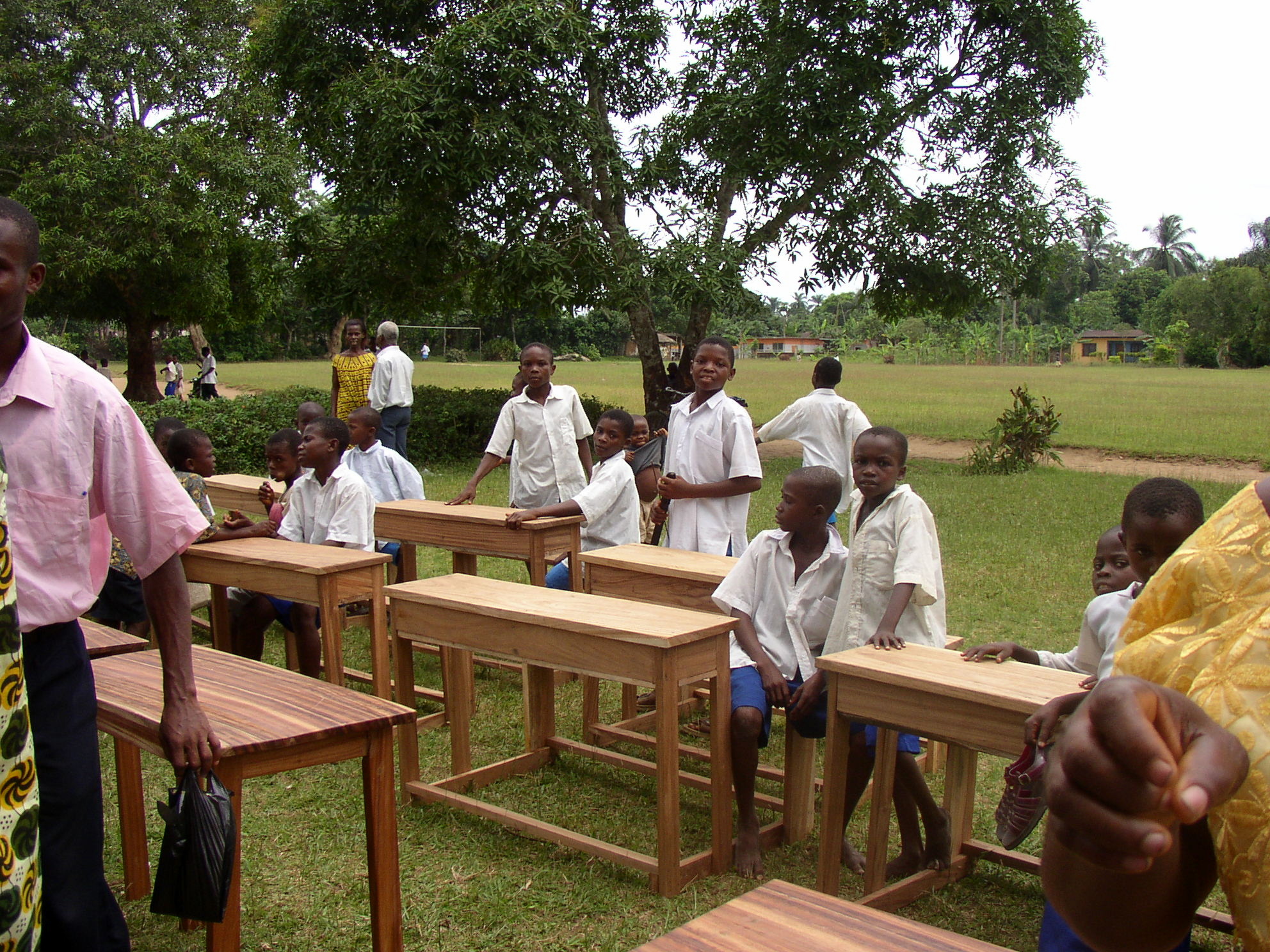
The students tried out the desks but the greatest sight was to see the teachers trying out the new chairs and tables. It is a day that will always be in our memory but it is also a day that will live in the memories of the students and teachers of the Ikot Eyo School.
They came to learn that Americans are generous people.
Southern Nigerians love their families and they love the Gospel of Jesus Christ. And because they learn by rote, they and can quote the scriptures chapter and verse! They are a visionary people many have had dreams that led them to converting to the gospel. In addition, many have identified the names of their ancestors through dreams. We were able to collect several personal histories of members of the church.
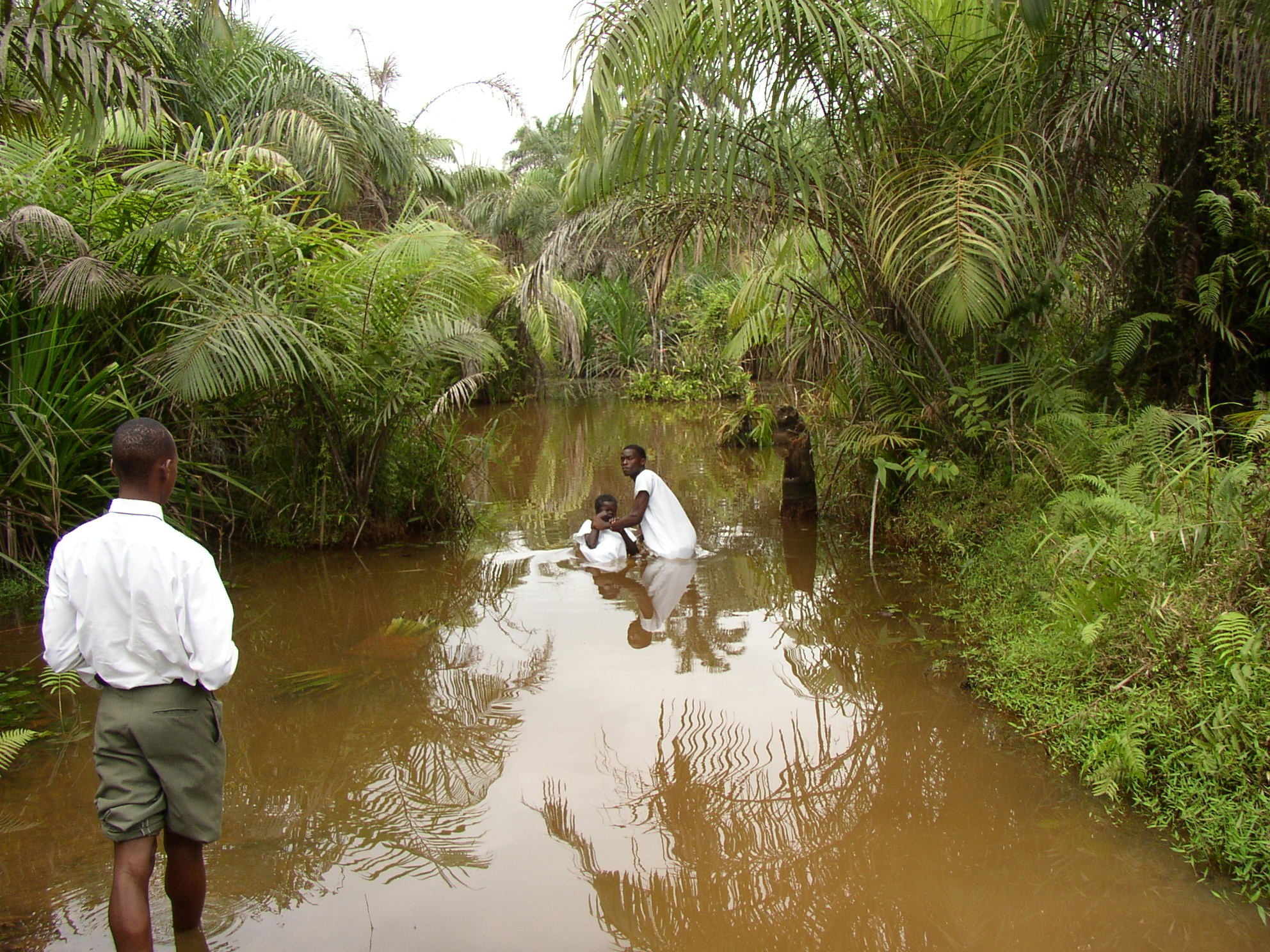
The church is still in its infancy in Nigeria. Missionaries did not arrive in Nigeria until 1978. The Port Harcourt Mission led the church in monthly conversions for many years. The mission was split on July 1, 2002 into two missions. The new mission is the Nigeria Uyo Mission. Both missions continue in large numbers of conversions each month. The people of Nigeria are waiting for the gospel! They will have a temple all of their own by December of 2004. What a blessing that will be! It is being built in Aba, Nigeria.
We came to love the people with all of our heart
and we have never felt so loved ourselves.
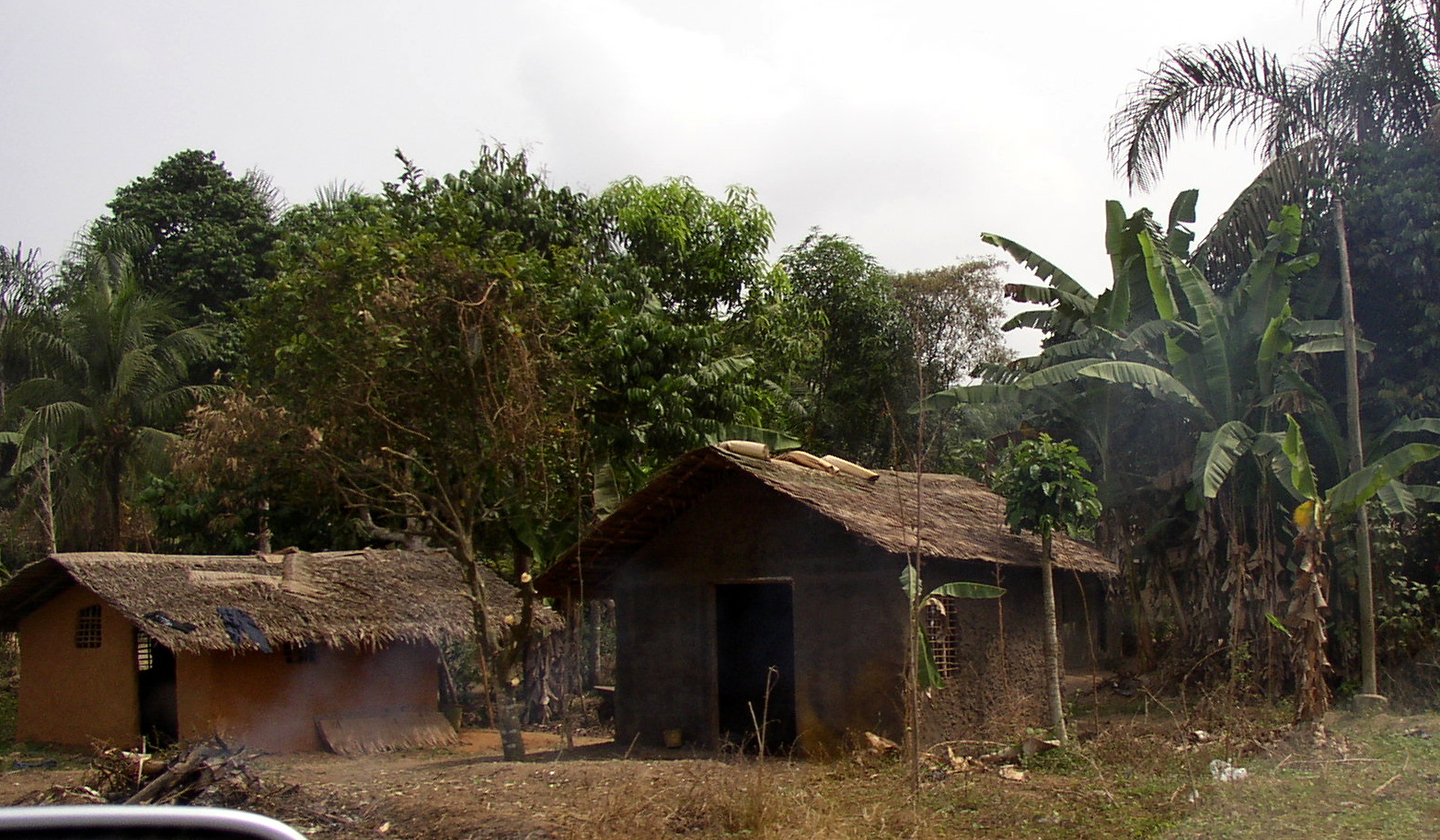
Whenever we met new people they always responded with "You Are Welcome!"
We felt no discrimination because of our skin color in fact the opposite was true. We had been there for quite awhile when my wife reached out to take a baby from its mother the baby shrieked because she saw my wifes white skin and white hair! Corinne shared with me that she felt so at one with the people that she had forgotten that she looks different!

I testify to you that the Gospel is true and that God is fulfilling His promise to seek out those individuals throughout the world that are waiting for the truth and will recognize it when they hear it.
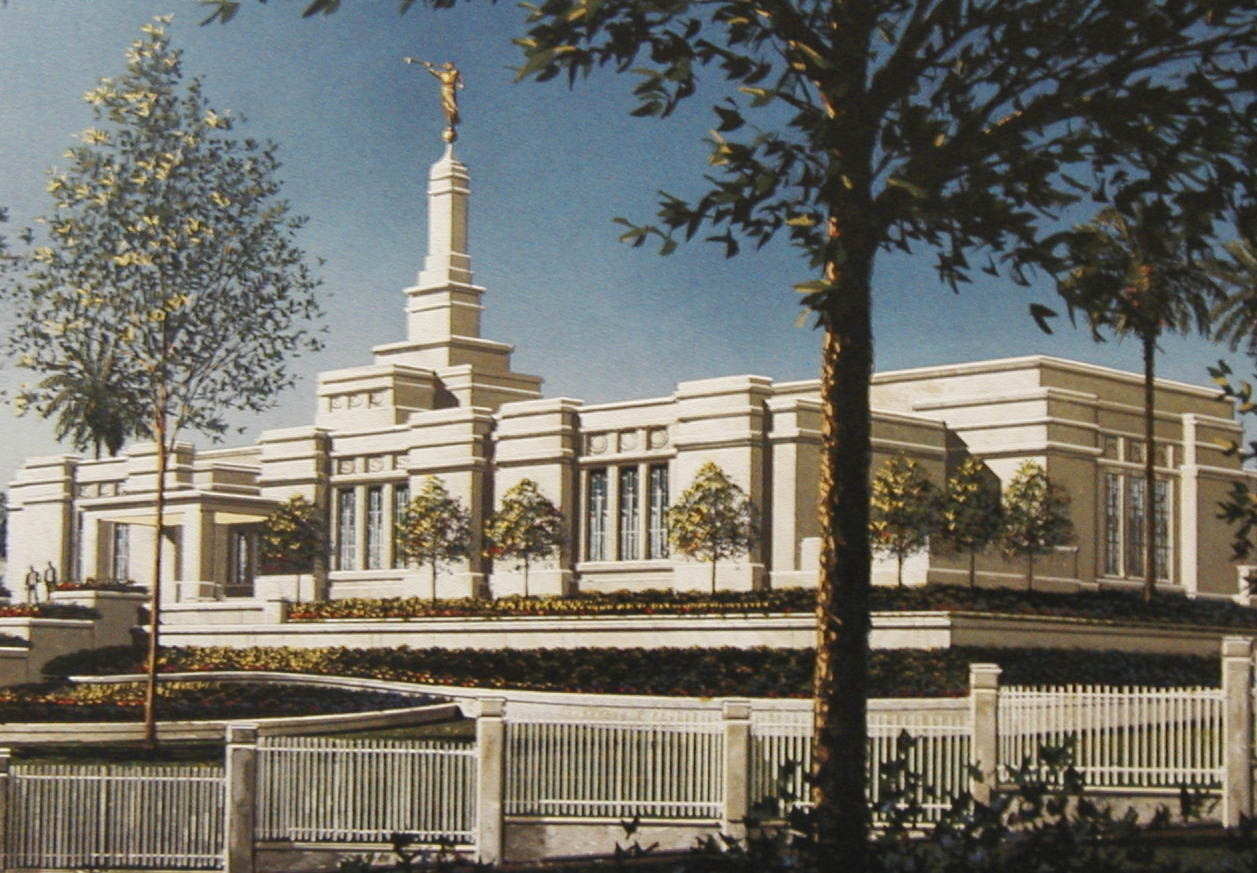
Africa is called the dark continent. West Africans did not receive the gospel until 1978 when the priesthood was made available to every worthy male. The Church is in it's infancy in Nigeria and the people are waiting for the truth. The Church has difficulty in keeping up with the growth. Buildings within walking distance are under constant construction. To bring about change in the Nigerian society it will take several generations of faithful saints living the gospel to the best of their ability. Social changes will necessitate several honest generations! Certainly the completion of the Aba Temple will make a large impact as the saints prepare themselves to be worthy to attend. What a marvelous blessing!
The Sacrifice that our Savior made was for all mankind! How I love Him for all that He has done for me. The Gospel is true! For those who are at an age where they can serve a mission, it would be my plea that you consider serving a senior mission. You will have the experience of your life! My wife and I are looking forward to the day in the eternities that we will greet our Nigerian friends again and they will tell us,
"...You Are Welcome!"
If you are or were a police officer,
soldier, fireman
or wife, mother, father of such or some other branch of emergency
personnel
and would like to share an unusual testimony building experience with
others,
please contact us for details at
or use the link on the front page of this site at
Thank you and God bless,
Samuel-LDS
"Think About it..." mailed to your home for only $12. S&H included
![]()
|
Read "Think About it..." Online
|
Warrior Stories |
Excerpts |
News Articles |
Poems |
S&J Liberty
Publishing
P.O. Box 7899
Mesa, AZ 85216-7899
A 317 page full size book, mailed to
your home for only $12. S&H included